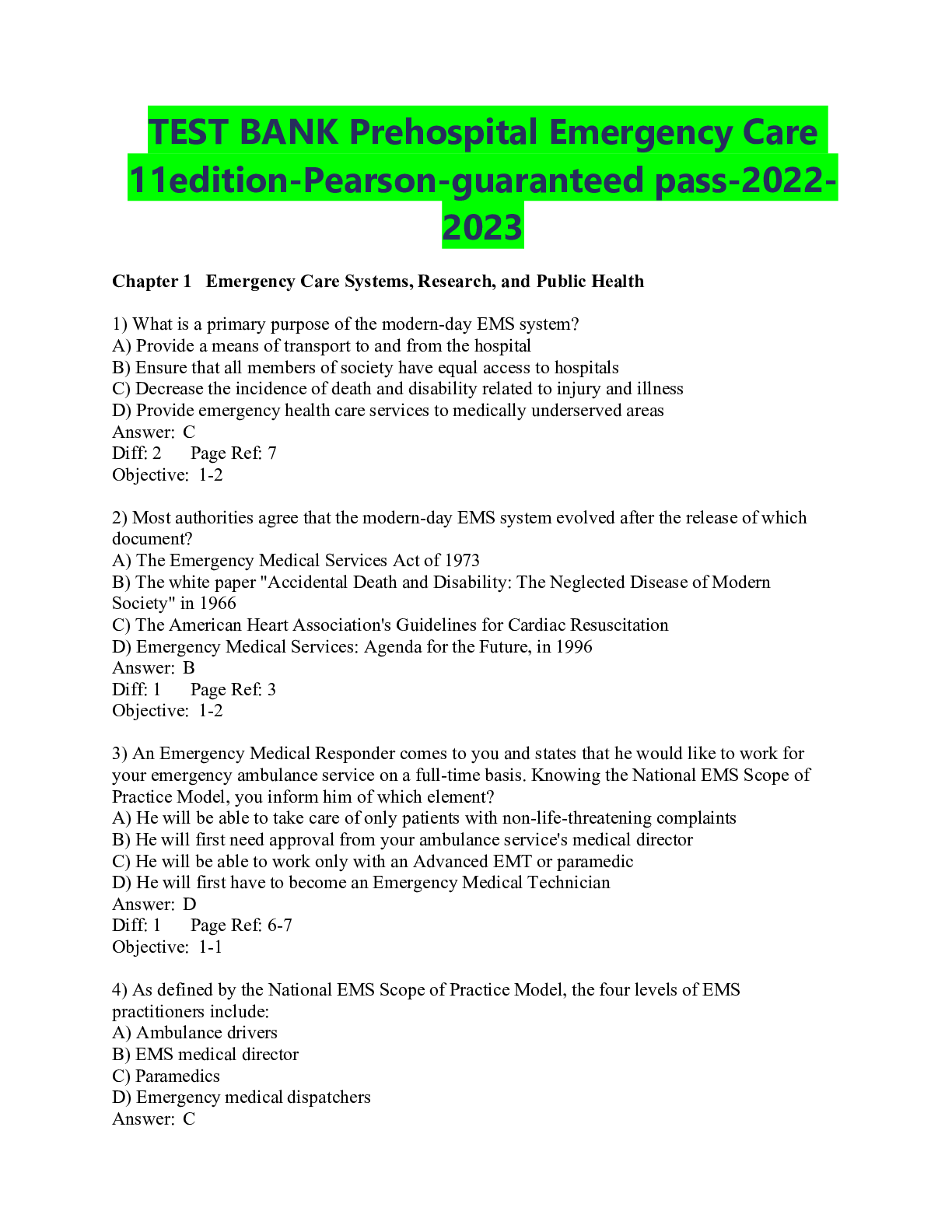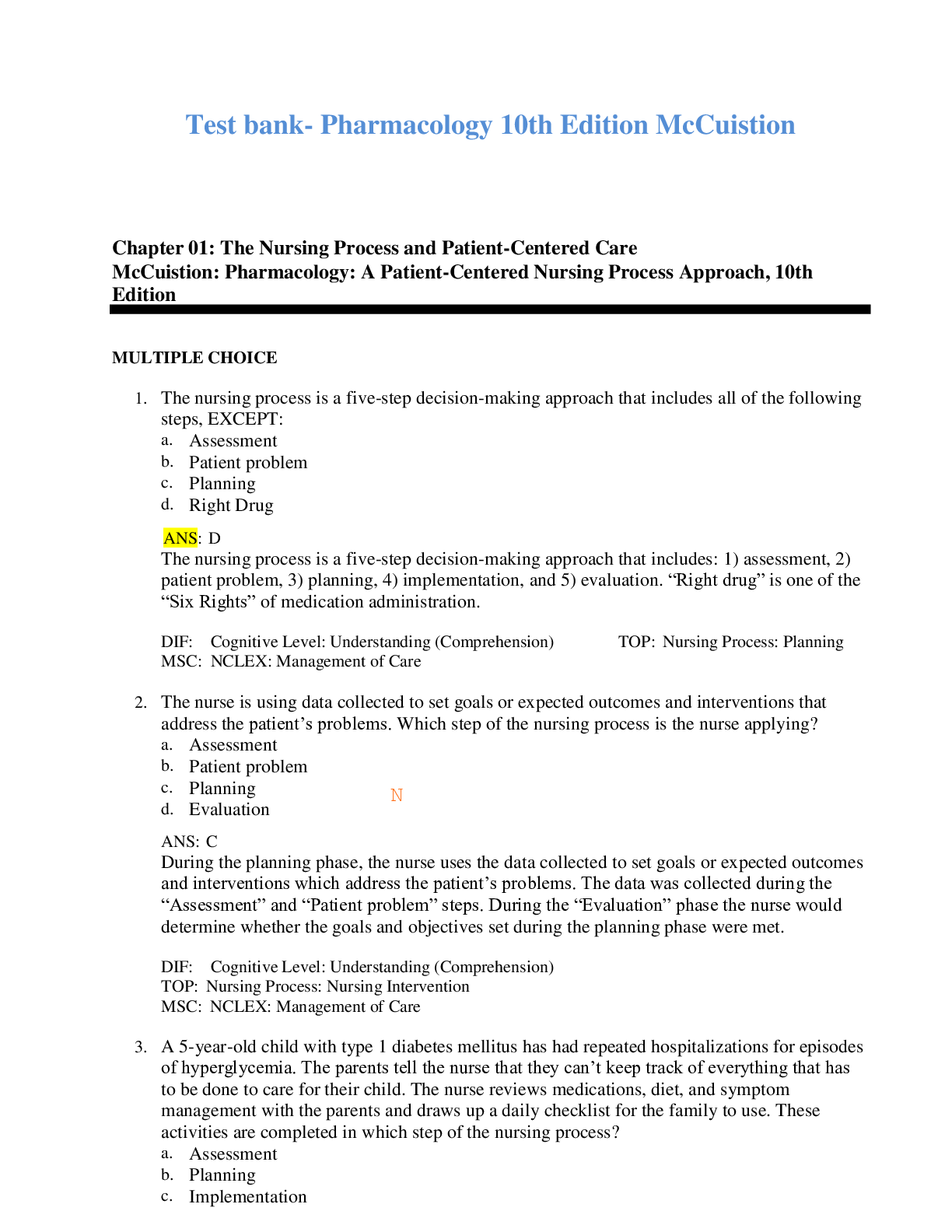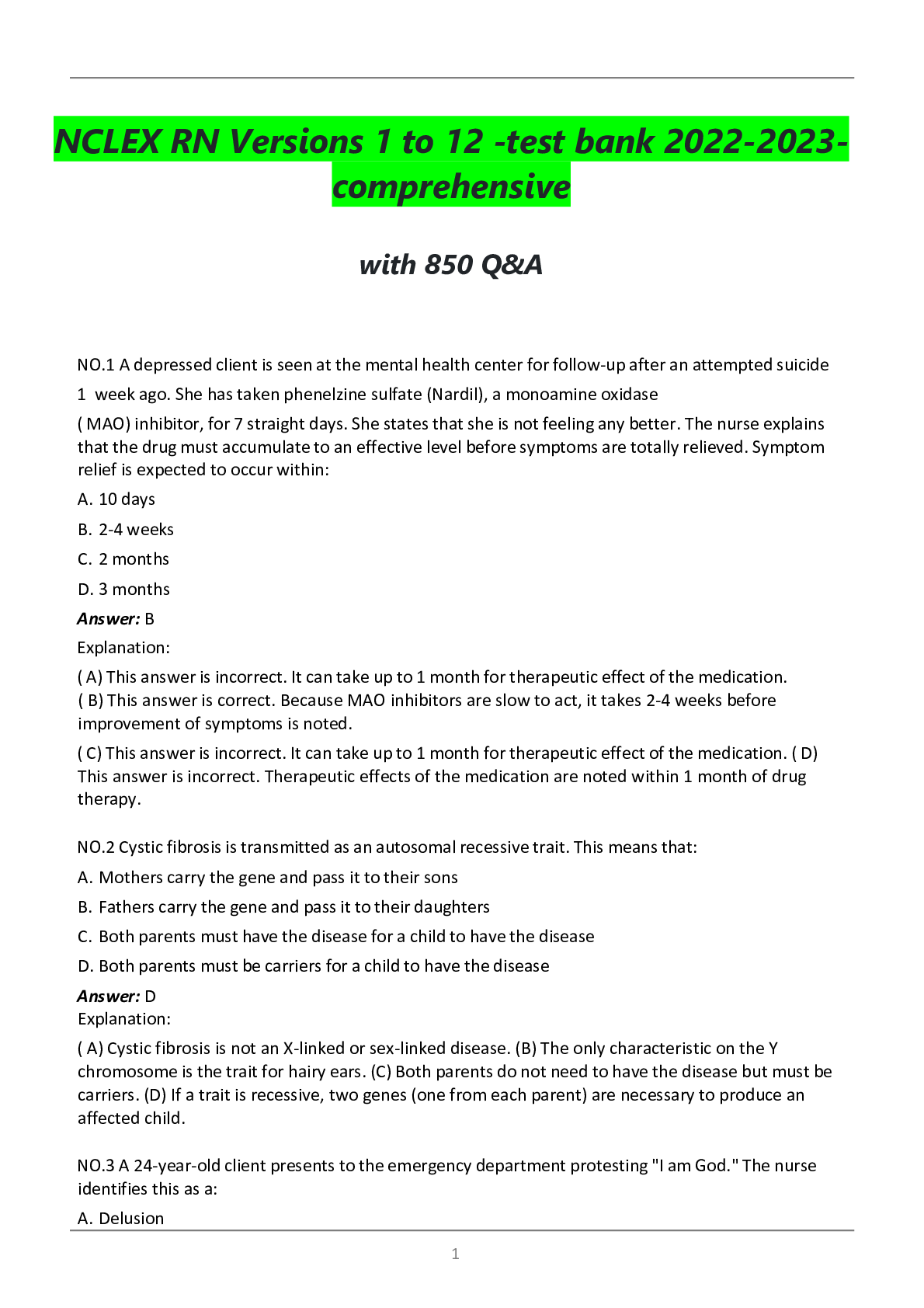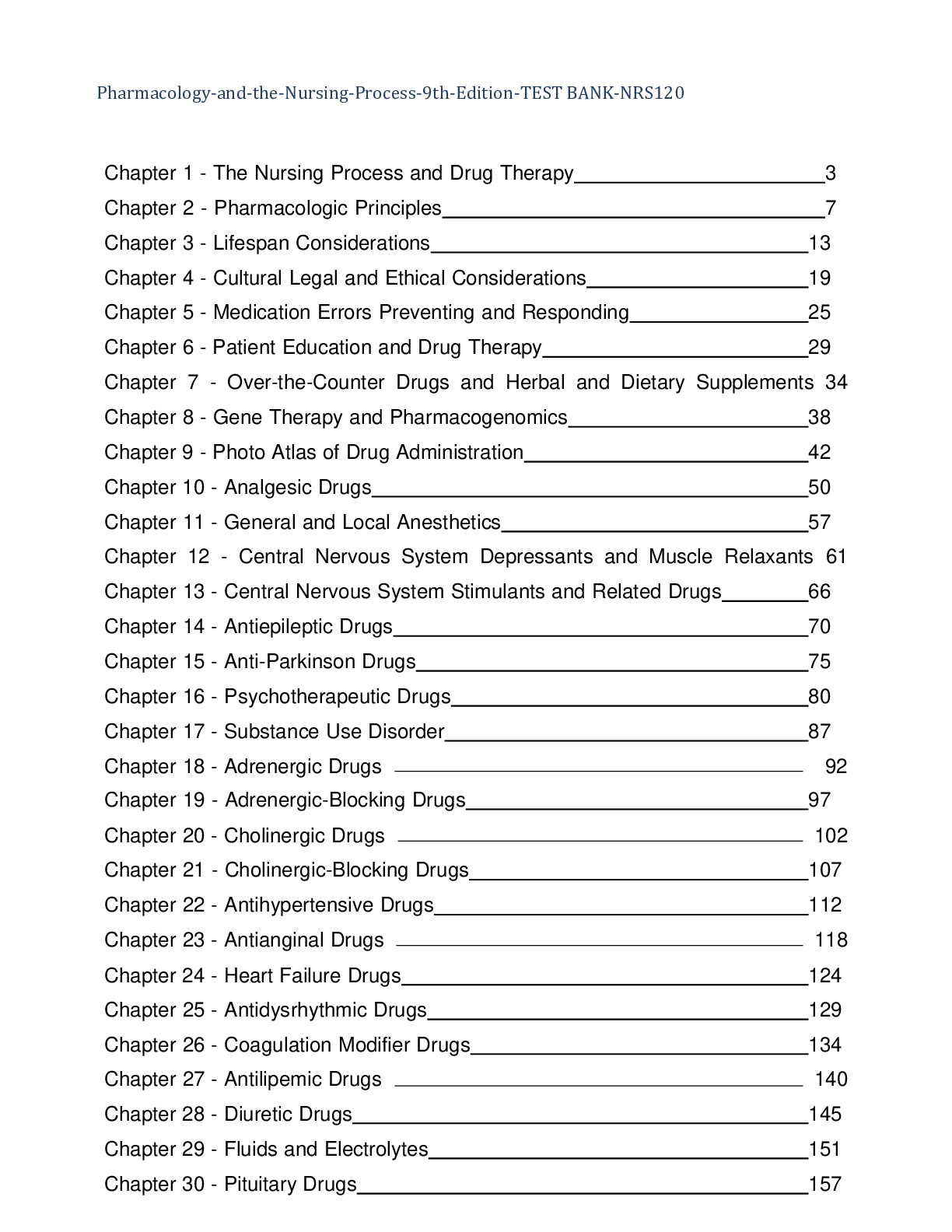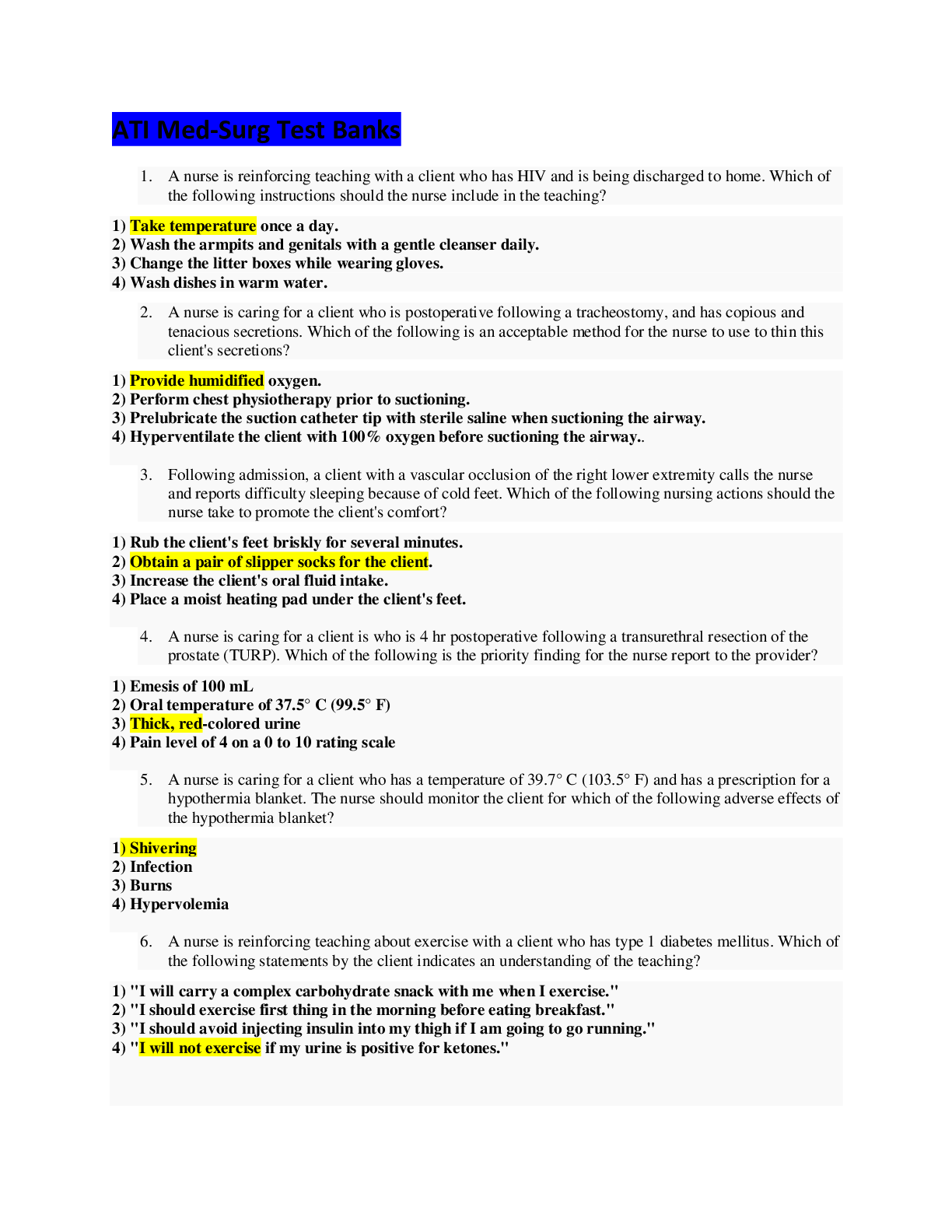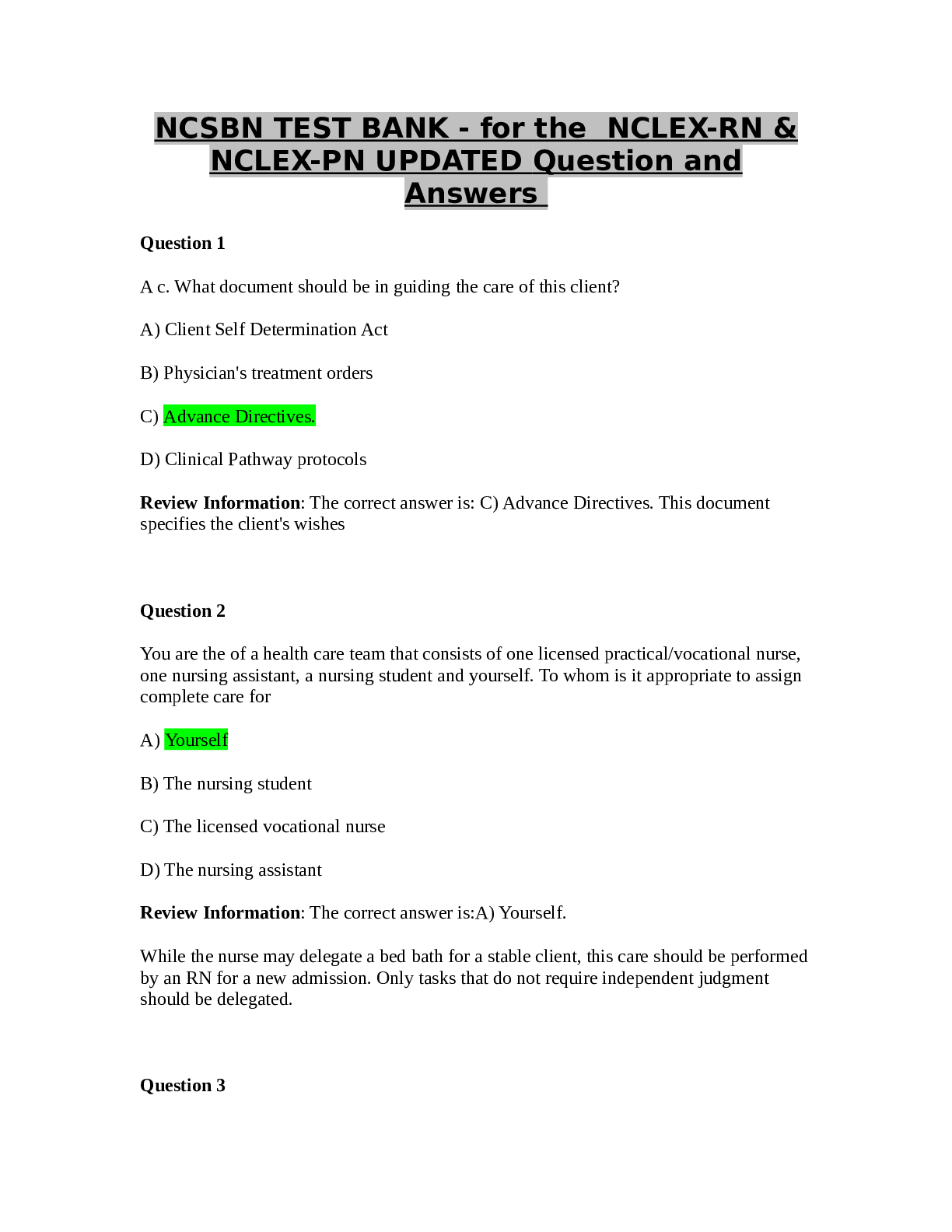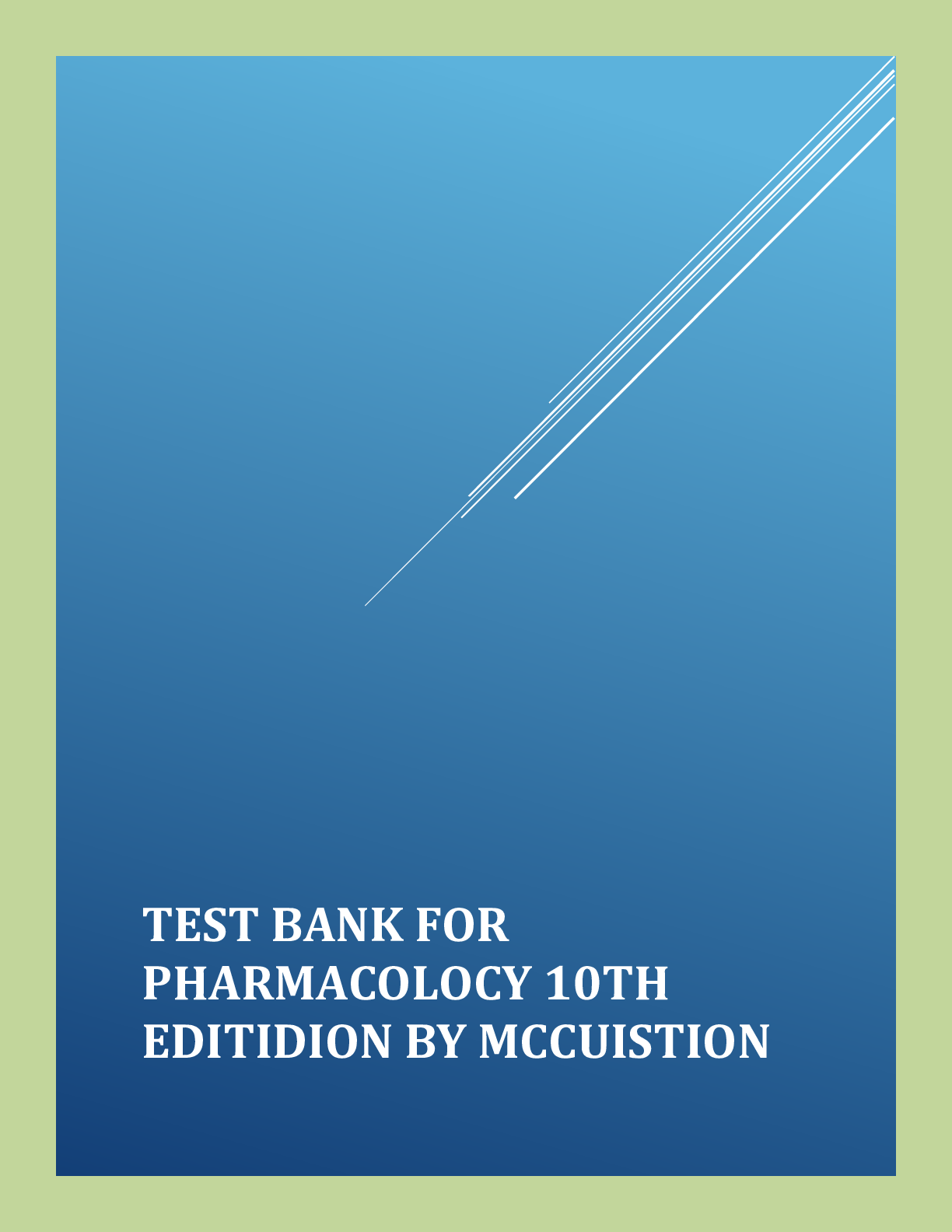*NURSING > TEST BANKS > NR 566 Test Bank Questions for Weeks 5- Spring 2021 (All)
NR 566 Test Bank Questions for Weeks 5- Spring 2021
Document Content and Description Below
1. Question: Kenneth is taking warfarin and is asking about what he can take for minor aches and pains. The best recommendation is 2. Question: Juanita had a DVT and was on heparin in the hospital an... d was discharged on warfarin. She asks her primary care provider NP why she was getting both medications while in the hospital. The best response is to: 3. Question: The safest drug to use to treat pregnant women who require anticoagulant therapy is: 4. Question: The average starting dose of warfarin is 5 mg daily. Higher doses of 7.5 mg daily should be considered in which patients? 5. Question: Cecil and his wife are traveling to Southeast Asia on vacation and he has come into the clinic to review his medications. He is healthy with only mild hypertension that is well controlled. He asks about getting “a shot” to prevent blood clots like his friend Ralph did before international travel. The correct respond would be: 6. Question: Robert, age 51 years, has been told by his primary care provider (PCP) to take an aspirin a day. Why would this be recommended? 7. Question: Sally has been prescribed aspirin 320 mg per day for her atrial fibrillation. She also takes aspirin four or more times a day for arthritis pain. What are the symptoms of aspirin toxicity she would need to be evaluated for: 8. Question: Patient education when prescribing clopidogrel includes: 9. Question: For patients taking warfarin INRs are best drawn: 10. Question: Patients receiving heparin therapy require monitoring of: 11. Question: The routine monitoring recommended for low molecular weight heparin is: 12. Question: When writing a prescription for warfarin it is common to write ____ on the prescription. 13. Question: Education of patients who are taking warfarin includes discussing their diet. Instructions include: 14. Question: Patients who are being treated with epoetin alfa need to be monitored for the development of: 15. Question: The FDA issued a safety announcement regarding the use of erythropoiesis-stimulating agents (ESAs) in 2010 with the recommendation that: 16. Question: When patients are started on darbepoetin alfa (Aranesp) they need monitoring 1. of their blood counts to determine a dosage adjustment in: 2. Question: Jim is having a hip replacement surgery and would like to self-donate blood for the surgery. In addition to being prescribed epogen alpha he should also be prescribed: 3. Question: Monitoring for a patient being prescribed iron for iron deficiency anemia includes: 4. Question: Patient education regarding taking iron replacements includes: 5. Question: Patients with pernicious anemia require treatment with: 6. Question: The first lab value indication that Vitamin B12 therapy is adequately treating pernicious anemia is: 7. Question: Patients who are beginning therapy with Vitamin B12 need to be monitored for: Week 5 Chapter 19: Drugs Affecting the Immune System 1. Question: Attenuated vaccines are also known as: 2. Question: Live attenuated influenza vaccine (FluMist) may be administered to: 3. Question: The reason that two MMR vaccines at least a month apart are recommended is: 4. Question: MMR vaccine is not recommended for pregnant women because: 5. Question: If the MMRV (measles, mumps, rubella, and varicella) combined vaccine is ordered to be given as the first MMR and varicella dose to a child the CDC recommends: 6. Question: The rotavirus vaccine (RotaTeq, Rotarix): 7. Question: Varicella vaccine is recommended to be given to patients who are: 8. Question: Zoster vaccine (Zostavax) is: 9. Question: True contraindications to diphtheria, tetanus, and acellular pertussis (DTaP or Tdap) vaccine include: 10. Question: Hepatitis B vaccine (HBV) is contraindicated in patients who: 11. Question: Human papillomavirus (HPV) vaccine (Gardasil, Cervarix): 12. Question: Influenza vaccine may be administered annually to: 13. Question: Immune globulin serums (IGs): 14. Question: Hepatitis B immune globulin (HBIG) is administered to provide passive immunity to: 1. Question: Rho(D) immune globulin (RhoGAM) is given to: 2. Question: Tuberculin purified protein derivative (PPD): 3. Question: Diane may benefit from cyclosporine (Sandimmune). Cyclosporin may be prescribed to: 4. Question: Azathioprine has significant adverse drug effects, including: Week 5 Chapter 27 Anemia 1. Question: Pernicious anemia is treated with: 2. Question: Premature infants require iron supplementation with: 3. Question: Breastfed infants should receive iron supplementation of: 4. Question: Valerie presents to clinic with menorrhagia. Her hemoglobin is 10.2 and her ferritin is 15 ng/mL. Initial treatment for her anemia would be: 5. Question: Chee is a 15-month-old male whose screening hemoglobin is 10.4 g/dL. Treatment for his anemia would be: 6. Question: Monitoring for a patient taking iron to treat iron deficiency anemia is: 7. Question: Valerie has been prescribed iron to treat her anemia. Education of patients prescribed iron would include: 8. Question: Allie has just had her pregnancy confirmed and is asking about how to ensure a healthy baby. What is the folic acid requirement during pregnancy? 9. Question: Kyle has Crohn’s disease and has a documented folate deficiency. Drug therapy for folate deficiency anemia is: 10. Question: Patients who are being treated for folate deficiency require monitoring of: 11. Question: The treatment of vitamin B12 deficiency is: 12. Question: The dosage of Vitamin B12 to initially treat pernicious anemia is: 13. Question: Before beginning IM Vitamin B12 therapy, which laboratory values should be obtained? 14. Question: ____ should be monitored when Vitamin B12 therapy is started. 15. Question: Anemia due to chronic renal failure is treated with: Week 5 Chapter 37: HIV 1. Question: The goals of treatment when prescribing antiretroviral medication to patients with HIV include: 2. Question: A challenge faced with antiretroviral therapy (ART) is: 3. Question: Predictors for successful treatment with antiretroviral therapy (ART) in HIV-positive patients include: 4. Question: The goal of antiretroviral therapy (ART) in HIV-positive patients is: 5. Question: Pregnant women who are HIV positive: 6. Question: Antiretroviral therapy is recommended for HIV-positive patients with: 7. Question: If considering starting a patient on the nucleoside reverse transcriptase inhibitor (NRTI) abacavir, the following testing is recommended prior to prescribing: 8. Question: Suzanne is pregnant and has tested HIV positive. Which antiretroviral drug should be avoided in women who are pregnant? 1. Question: The cost of HIV treatment can be prohibitive for any patient. Patients can receive assistance from the: 2. Question: Resistance to antiretroviral therapy (ART) is measured by: 3. Question: Phenotype assays are used to measure ____ of antiretroviral therapy (ART). 4. Question: Patient factors that contribute to antiretroviral therapy (ART) failure include: 5. Question: Patients who are taking antiretroviral therapy (ART) need to have the following monitored: 6. Question: Successful antiretroviral therapy (ART) in an HIV-positive patient is determined by: Week 6 Chapter 22 Drugs affecting the reproductive system 1. Question: Men who use transdermal testosterone gel (AndroGel) should be advised to avoid: 2. Question: Education when prescribing androgens to male patients includes: 3. Question: Patients who are prescribed exogenous androgens need to be warned that decreased libido: 4. Question: The U.S. Food and Drug Administration (FDA) warns that androgens may cause: 5. Question: Monitoring for a patient who is using androgens includes: 6. Question: Male patients require ____ before and during androgen therapy. 7. Question: Absolute contraindications to estrogen therapy include: 8. Question: Women with an intact uterus should not be prescribed: 9. Question: Women who have migraine with aura should not be prescribed estrogen due to: 10. Question: A 22-year-old women receives a prescription for oral contraceptives. Education for this patient includes: 11. Question: A 19-year-old female is a nasal Staph aureus carrier and is placed on 5 days of rifampin for treatment. Her only other medication is combined oral contraceptives. What education should she receive regarding her medications? 12. Question: A 56-year-old women is complaining of vaginal dryness and dyspareunia. To treat her Continued……………. [Show More]
Last updated: 2 years ago
Preview 1 out of 25 pages
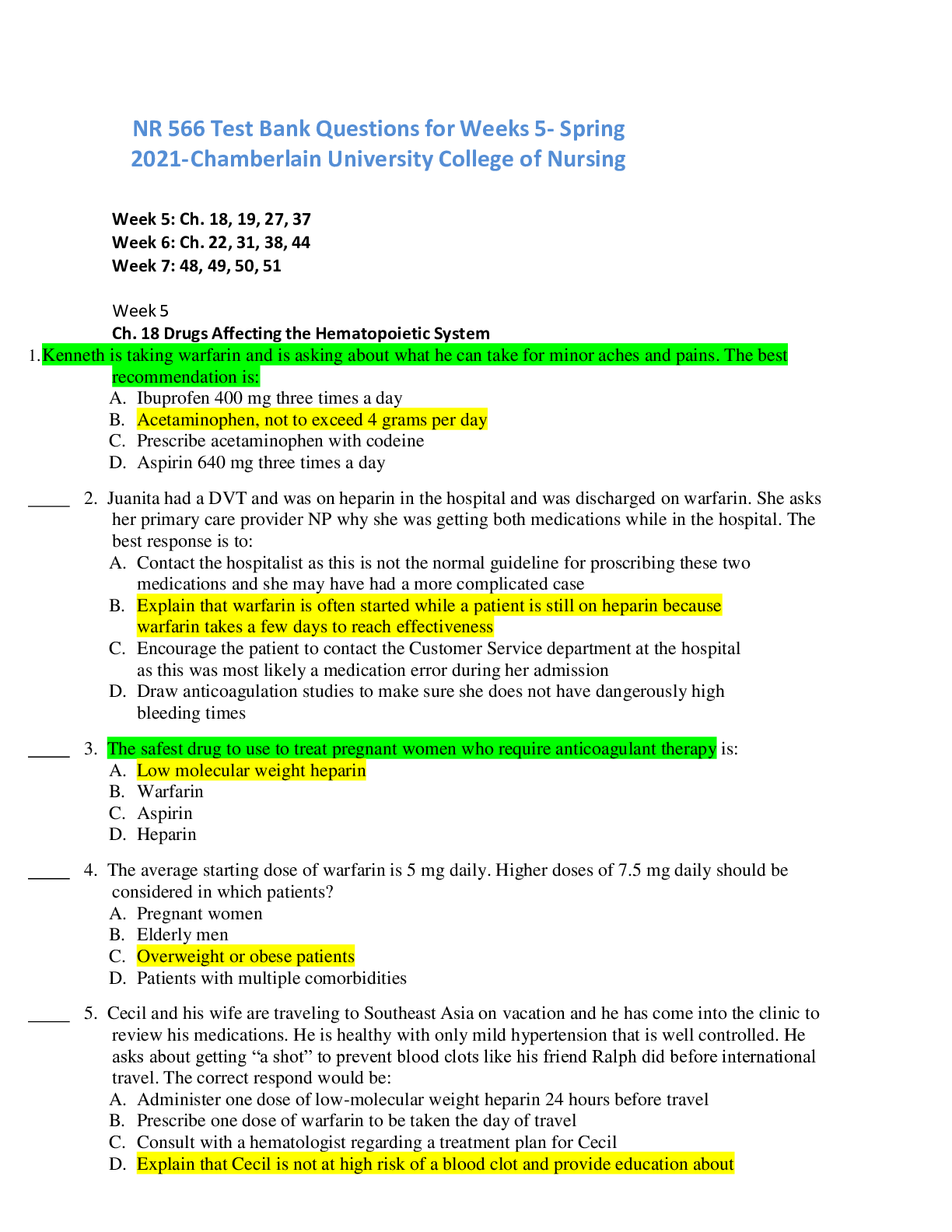
Buy this document to get the full access instantly
Instant Download Access after purchase
Buy NowInstant download
We Accept:

Reviews( 0 )
$18.00
Can't find what you want? Try our AI powered Search
Document information
Connected school, study & course
About the document
Uploaded On
Feb 03, 2022
Number of pages
25
Written in
Additional information
This document has been written for:
Uploaded
Feb 03, 2022
Downloads
0
Views
61


